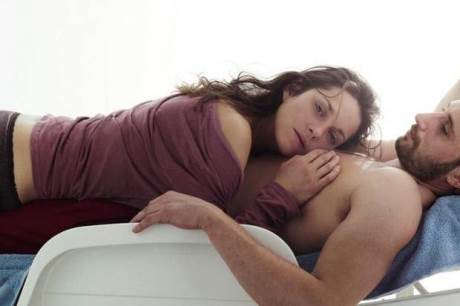In the hour-long "Making Rust and Bone" supplemental film directed by Antonin Peretjatko included with the DVD, director Jacques Audiard discusses the thought process behind approaching a work of this nature. Clearly outlining his intentions to make an expressionist piece, he acknowledges that his early interpretation of the script — a term noted by one of his female friends — was that it was "melo-trash." Indeed, Rust and Bone, a film about an orca trainer (Marion Cotillard) that develops an unusual bond with a bouncer and street fighter (Matthias Schoenaerts) after losing her legs in a freak accident on the job, is inherently melodramatic and contrived. It's intentionally so, being a parable and emotional response to animal instincts and base passions, desires and self-destructive behaviour when everything is, quite literally, stripped to the bone. Alain (Schoenaerts) is an untamed, uncouth walking id-impulse filled with good intentions but an inability to approach the world with any sort of grace or tact. He pulls his son from a damaging environment — a drug mule for his addict mother — to raise him in Antibes with his slightly more put together sister and her family. Though his motivations are pure, he is ill equipped to act as a parent and role model for his son, being impatient, with emotional outbursts and shyness in an emotionally damaging and borderline violent way. Oddly, this wild and capricious disposition is an ideal match for the grieving Stephanie (Cotillard), whose dramatic life change and forced introspection demand some practical risk beyond the pity and sympathy she receives from those around her. Even before the accident, Stephanie was drawn to danger, training wild animals — much like she does Alain, eventually — and getting in fights with men at clubs, which is incidentally where she meets her gruff, kickboxing saviour for the first time. Their connection and budding romance, which plays out as a highly emotional series of creative behaviour modification techniques on the part of Stephanie, who actually has to point out to Alain that she isn't keen on hearing about the other women he sleeps with, is as contrived as her eventual subtext-gone-literal transformation into his fight manager. But Audiard handles all of this with a sun-blanched, gritty, handheld realism juxtaposed with a highly lyrical, emotional slow motion style that makes it all work. As discussed on the commentary track, Audiard realized that he couldn't just force his characters into the vacuum of fantasy and metaphor; rather, he had to make their lives seem real, thus transporting the unhealthy passion of their romance into otherworldly, fervid territory. And this is precisely why Rust and Bone leaves a lasting impression, despite the nagging feeling of manipulation.
(Sony)Rust and Bone
Jacques Audiard

BY Robert BellPublished Mar 29, 2013



